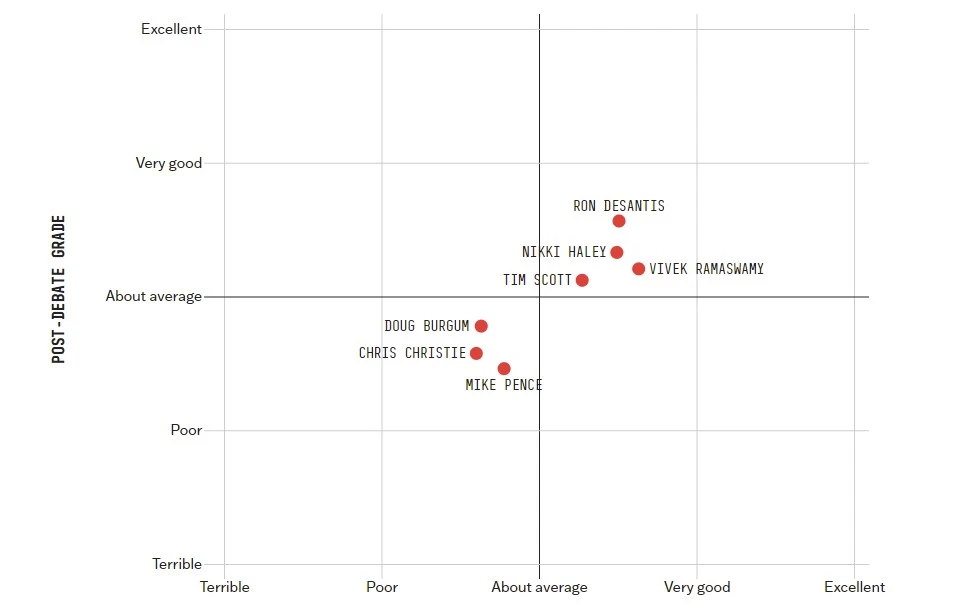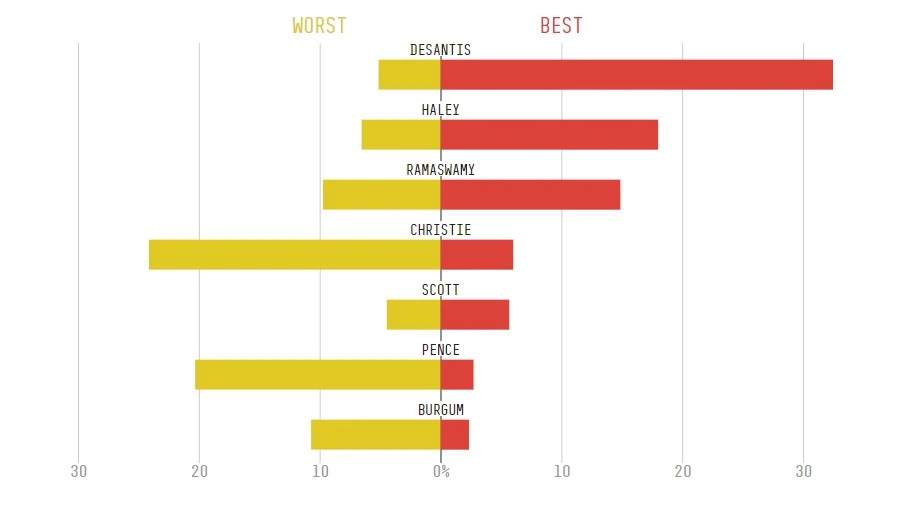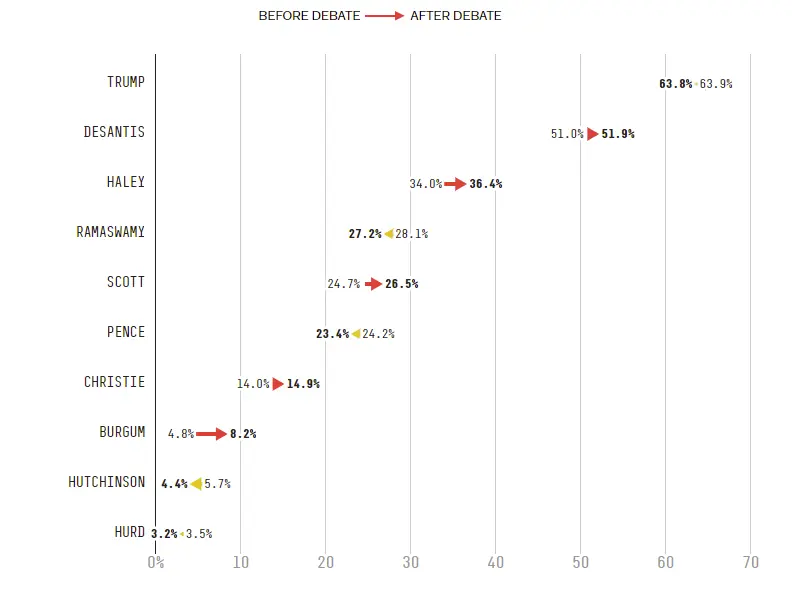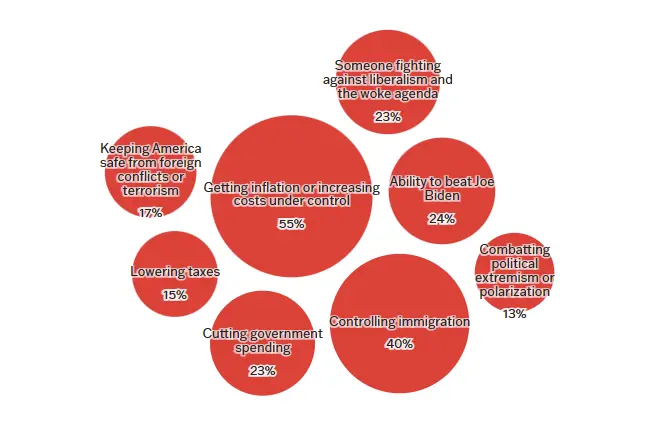Analyzing the Outcome of the Second Republican Debate Through Advanced Polling Techniques In a groundbreaking collaboration with The Washington Post and Ipsos, we embarked on a mission to gauge the victor of the highly anticipated second Republican debate. Employing state-of-the-art polling methodologies, we endeavored to discern the impact of this debate on the electorate.
Table of Contents
Determining a definitive winner from the tumultuous Republican primary debate that unfolded on Wednesday night proved to be an elusive task. The contenders, it appeared, were more inclined to engage in overlapping dialogues than to provide direct responses to the queries posed to them. Consequently, the debate appeared to exert minimal influence on the perspectives of the electorate.
This revelation stems from an unprecedented 538 Washington Post/Ipsos poll, meticulously executed with Ipsos’s KnowledgePanel, conducted in the immediate aftermath of Wednesday’s debate. We tasked likely Republican primary voters who tuned into the debate with evaluating the performance of each candidate. Moreover, to ascertain whether these performances had the power to sway opinions, we collected the sentiments of likely Republican primary voters, encompassing both debate spectators and non-viewers, both prior to and following the debate. Herein lies the illuminating outcome:
Evaluating Candidate Performance Discrepancies Among Likely Republican Primary Voters
Assessing the Discrepancy Between Pre-Debate Expectations and Post-Debate Perceptions of Candidate Performance Among the Audience

We queried respondents regarding their anticipated and observed evaluations of each candidate's performance, utilizing a five-point grading system ranging from 'excellent' to 'terrible.' These responses were subsequently quantified on a scale of 1 to 5, with 'excellent' equating to 5, 'very good' to 4, 'about average' to 3, 'poor' to 2, and 'terrible' to 1. The resultant scores were then aggregated to derive comprehensive assessments for each candidate. Respondents who responded 'don't know' to either the expectations or performance inquiries were omitted from the analysis."
In our survey, viewers of the debate were tasked with evaluating each candidate’s performance using a five-point grading system, ranging from ‘excellent’ to ‘terrible.’ Upon averaging the scores for each candidate, it became evident that Florida Governor Ron DeSantis emerged as the standout performer. However, it is important to note that Governor DeSantis faced lofty pre-debate expectations, as measured using the same rating scale. Consequently, the extent of credit attributed to his performance may be somewhat tempered.
Remarkably, the candidates who were anticipated to deliver strong showings mostly fulfilled those expectations, including all four candidates with high pre-debate expectations. Conversely, candidates who faced low expectations generally adhered to, or even fell below, these initial projections.
Notably, businessman Vivek Ramaswamy faced considerable pre-debate anticipation, yet his performance was only marginally rated as above-average by voters. It is worth considering that Ramaswamy found himself the target of numerous attacks from fellow candidates during the debate, which may have influenced this assessment.
In addition to evaluating the candidates, our survey extended to the assessment of the moderators, who at times appeared to struggle with maintaining control over the debate proceedings. On several occasions, candidates interrupted the moderators in their efforts to transition to new topics. The results revealed that the moderators received rather lackluster marks, with an average performance rating of 3.06 out of 5, with 5 representing an excellent performance. This stands in stark contrast to the August debate, where Republican viewers bestowed an average score of 3.38 upon the moderators.
Assessing the Debate Victors and Losers:
Percentage of Likely Republican Primary Voters Who Watched the Debate, Identifying the Best and Worst Performers Among the Candidates.

An Alternate Measure of Debate Performance: Evaluating Candidates Based on Direct Viewer Feedback
When directly questioned, Florida Governor Ron DeSantis emerged as the undisputed victor, with a resounding 33 percent of likely Republican voters who watched the debate acknowledging his stellar performance. In stark contrast, a mere 5 percent of viewers considered him the weakest performer.
Following closely behind, former U.N. Ambassador Nikki Haley claimed the second spot, with a notable 18 percent of viewers recognizing her as the most formidable debater, while only 7 percent viewed her as the weakest.
Perceptions of Vivek Ramaswamy’s performance proved to be polarized, as 15 percent of Republican voters considered him the best performer, while an equally notable 10 percent regarded him as the weakest link. In contrast, South Carolina Senator Tim Scott elicited relatively mild reactions, with only 6 percent viewing him as the standout debater and 4 percent rating him as the weakest.
However, the most unequivocal judgments were reserved for former New Jersey Governor Chris Christie, with a substantial 24 percent of voters deeming him the poorest performer, and former Vice President Mike Pence, who garnered 20 percent of the votes for the weakest performance. It appears that voters remained unswayed by Christie’s ‘Donald Duck’ quip and Pence’s joke about his marital relationship.
Post-Debate Impact on Candidate Support:
Percentage of Likely Republican Primary Voters Considering Each Candidate After the Debate, Compared to Their Consideration Before the Debate.

The Impact of the Debate on Candidate Support:
Assessing Changes in Support Among Likely Republican Primary Voters
In the long-anticipated evaluation of whether the debate would substantially influence candidate support, it appears that the race remains largely unaltered. We conducted a comprehensive survey of likely Republican primary voters, encompassing both those who watched the debate and those who did not, inquiring about the candidate(s) they were contemplating voting for. Respondents were permitted to select multiple options, and the results were compared to their pre-debate preferences. Surprisingly, the data revealed minimal shifts in the dynamics of the race.
North Dakota Governor Doug Burgum emerged as the candidate with the most notable increase in potential supporters, edging up from 5 percent before the debate to 8 percent after it. Nevertheless, this modest gain underscores the relative stability of the field, as no other candidate’s potential support witnessed a shift of more than 3 percentage points.
Notably, despite his absence from the debate, former President Donald Trump continues to exert a dominant presence in the race, with a staggering 64 percent of likely Republican voters indicating their consideration of voting for him.
The Popularity Contest:
Assessing Candidates’ Favorable and Unfavorable Ratings Among Likely Republican Primary Voters Before and After the Debate
The Continuity in Voter Sentiment:
Assessing Candidates’ Favorable and Unfavorable Ratings Among Likely Republican Primary Voters, Both Pre and Post-Debate
Our examination extended to the opinions of likely Republican primary voters, including both debate viewers and non-viewers, regarding each candidate before and after the debate. Once again, the data reveals a remarkable stability in voter sentiment. Notably, North Dakota Governor Doug Burgum stood out as the sole candidate to experience a significant uptick in his favorable rating, surging from 13 percent to 19 percent among Republicans.
However, it’s important to note that this increased favorability came with a caveat, as Burgum’s unfavorable rating also saw a noteworthy rise, climbing from 13 percent to 22 percent. This suggests that the exposure he received during the debate had both positive and negative effects on his image.
In a similar vein, candidates like Tim Scott, Vivek Ramaswamy, Nikki Haley, Mike Pence, and Ron DeSantis all saw slight declines in their favorability after the debate. It’s plausible that the contentious exchanges on the debate stage may have cast a shadow over their public perception.
Prioritized Issues Among Likely Republican Primary Voters Before the Debate: Percentage of Voters Who Considered Each Issue Among the Most Important in Determining Their Primary Vote

The Top Eight Prioritized Issues Among Likely Republican Primary Voters
- Economy and Jobs: 24%
- Immigration: 18%
- Taxes: 17%
- National Security and Terrorism: 13%
- Government Spending and Debt: 12%
- Protecting Gun Rights: 11%
- Reducing Crime or Gun Violence: 11%
- Improving Election Security or Fighting Election Fraud: 11%
It’s noteworthy that these issues have garnered the most attention and concern among likely Republican primary voters. Other important topics include improving healthcare, limiting abortion, strengthening education, combating opioid or drug addiction, addressing climate change, addressing economic inequality, and addressing issues related to race and racism, although to a lesser extent.
Finally,
Pre-Debate Prioritized Issues Among Likely Republican Primary Voters:
Among Republican voters who participated in both phases of our survey, the foremost concern was controlling inflation or reducing increased costs, with a significant 55 percent placing paramount importance on this issue. Additionally, 40 percent of respondents considered controlling immigration as a top priority in determining their primary vote. Interestingly, the debate format aligned with these priorities, as the opening segment focused on the economy, and immigration emerged as a prominent topic throughout the evening, as reported by The New York Times.
All the data presented in this analysis stems from polling conducted by Ipsos on behalf of 538 and The Washington Post, utilizing Ipsos’s KnowledgePanel—a probability-based online panel designed to mirror the demographic makeup of the U.S. population. The same cohort of respondents participated in both pre and post-debate surveys to track any shifts in their responses. The initial wave of polling was carried out from September 19 to September 26, encompassing a general population sample of adults, which included 5,002 respondents who self-identified as likely to vote in their state’s Republican primary or caucus. Within this likely Republican primary voter subset, the margin of error for the first wave of the poll is ±1.6 percentage points.
The second wave of the poll was conducted late on the night of September 27 and early on the morning of September 28, involving 2,262 of the likely Republican primary voters who had previously participated in the first wave. The margin of error for this second wave is ±2.3 points. Among these respondents, 730 had watched the debate, constituting a subset with a margin of error of ±4.1 points.
Original News Published on: 538 Original Editors: Editing by Amelia Thomson-DeVeaux and Maya Sweedler. Copy editing by Cooper Burton. Visual editing by Christopher Groskopf. Additional contributions from Mary Radcliffe. Art by Katrina Stapleton.
Election Year 2024: Upcoming Election
Donald Trump
The former president gave a speech to an auto parts plant in Michigan while his Republican rivals were having a national televised debate. Here is a fact check on three of his speech’s assertions.
According to the most recent polls, Trump is performing about as well as any contender in the history of competitive presidential primaries, argues Nate Cohn.
Biden, President
One day after the other, the president and Donald Trump visited Michigan to address working-class voters in what amounted to a campaign preview for the year 2024. Their opposing fashions were evidently on exhibit.
In a statement that marks one of his most pointed critiques of his primary Republican rival in quite some time, President Biden depicted Trump as an emerging autocrat devoid of allegiance to the principles of American democracy.
G.O.P. Field
Ron DeSantis: The Florida governor appeared confident during the second Republican debate, but there isn’t much time left to turn around his polling decline.
Vivek Ramaswamy and Nikki Haley: For the first time in the country’s history, there are two Indian Americans running for president. However, some Indian Americans find it difficult to truly appreciate the occasion due to their fervent conservatism.
Timothy Scott The presidential contender is hardly unique in America as a lifelong bachelor. On the campaign trail, though, it is almost difficult to ignore his married status.
Chris Christie: The former governor of New Jersey, who is focusing his campaign on New Hampshire, stated in an interview that he would not allow Trump to “get away with being a coward.
